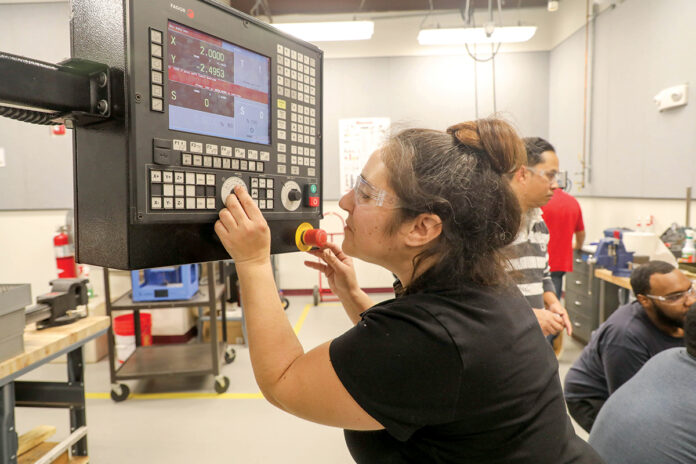
PBN Manufacturing Awards 2022
EXCELLENCE IN COLLABORATION IN MANUFACTURING:
Community College of Rhode Island and Polaris MEP
While scholars debate the merits of a four-year college education, community colleges continue to fill the gap when it comes to helping students get jobs, thanks in part to strategic partnerships with industries.
The Community College of Rhode Island’s Division of Workforce Partnerships works in close collaboration with industry and business leaders to ensure the college’s offerings are meeting both current and future workforce needs. Gross revenue for the past three years for CCRI Workforce Partnerships was $15.6 million.
Polaris MEP, a statewide nonprofit organization and affiliate of the National Institute of Standards and Technology’s Manufacturing Extension Partnership, provides competitive business improvement programs to grow Rhode Island’s manufacturing industry.
The computer numerical control manufacturing program called Fast Track to CNC Manufacturing is one example of a popular and successful collaboration between CCRI and Polaris MEP.
The first cohort began in September 2017 when CCRI and Polaris MEP launched the program. To date, they have completed 16 cohorts.
Currently, the program is in phase 1 for cohort 17, both at CCRI, with 15 students enrolled, and at the R.I. Department of Corrections women’s facility, where six inmates are currently enrolled.
So far, 175 students have completed phase 1 and 90 students have moved onto phase 2. In addition, 64 students have completed all six courses and received their CNC certificate from CCRI. Students have been placed at more than 50 different manufacturers in Rhode Island.
CCRI and Polaris MEP employees are encouraged to take part in training offered by both organizations. CCRI provides credit courses offered from CCRI, Rhode Island College or the University of Rhode Island to eligible employees at no cost. With the additional training, and in some cases additional college degrees, career advancement is accelerated.
In phase 1, students earn 13 college credits in the 19-week program that introduces the fundamentals of manufacturing, safety, precision measurement and blueprint reading.
They also get job interview training, resume building and help finding their first position in manufacturing as a CNC operator, quality control person, or entry-level manual machinist or toolmaker. Students also earn Occupational Safety and Health Administration OSHA-10 certification.
While in phase 2, students earn six college credits while learning deeper skills and cutting-edge advanced manufacturing processes to become a CNC machinist.
“Polaris MEP, being the industry partner, had access to a lot of different employers that they were able to bring into the college to sit down with us and review curriculum that existed and make some suggestions on how it could be improved and what gaps there were,” said Jaime Nash, CCRI executive director of workforce operations.
Nash says the goal of the program is to get people on an entry-level career path where they make good wages and ultimately get a certificate or degree.
“It’s a wonderful partnership and a great example of how collaboration can work to strengthen outcomes and reduce duplication of services,” said Lindsey Brickle, Polaris MEP senior workforce manager.
“People who are hiring in the program want to hire more. The demand for CNC machinists is outpacing the need, so we are working with our partners to increase capacity in the state and help reduce barriers to accessing training and employment,” Brickle said.
James Thomson, coordinator of the CNC manufacturing program at CCRI, says feedback from the students has been positive.
“The feedback from a lot of students has been: ‘I knew this was going to be a good program. I heard about it from my employer or my neighbor. But it is even better than I thought it was going to be. I feel more prepared and more ready for either enhancing my skills in this area or pivoting,’ ” Thomson said.
One-quarter of the students that have gone through the program have earned a bachelor’s degree.
“So, they come back to what they love, working with their hands and doing what they want to do versus what their parents or some influencer has told them that they should do,” Thomson said.












